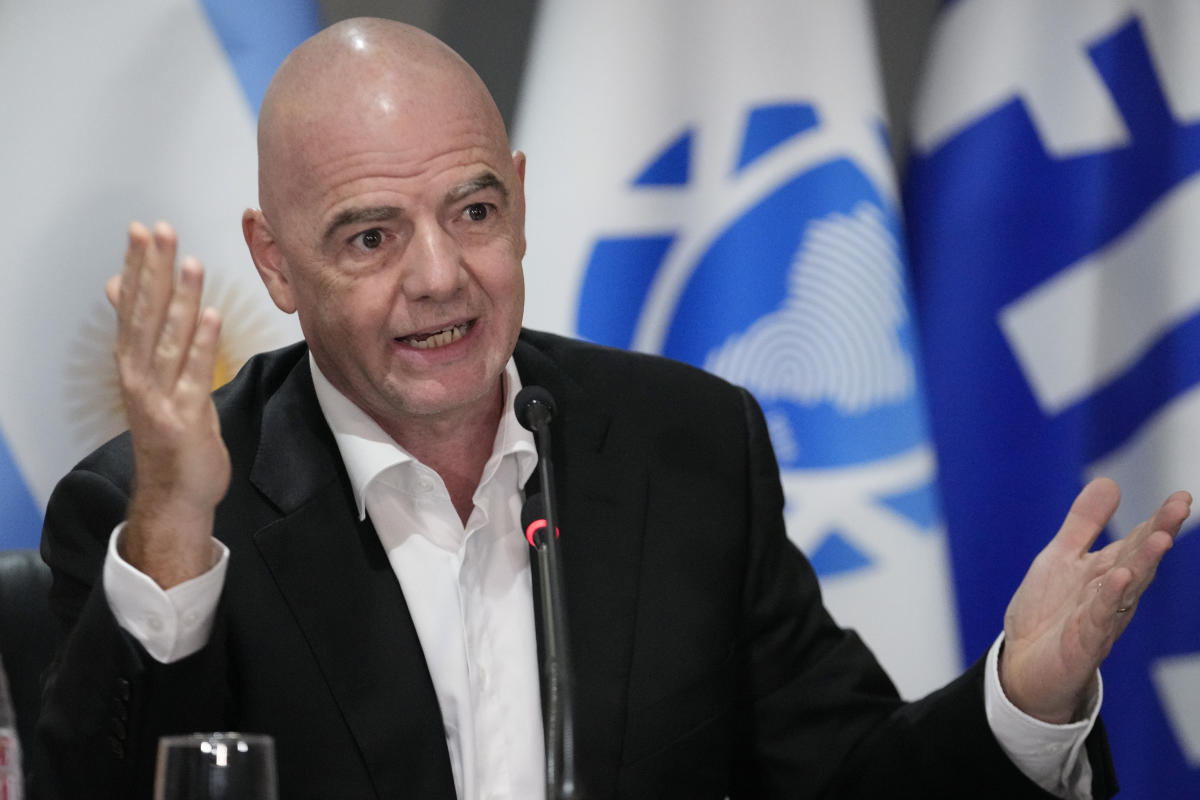
Why FIFA’s threat of Women’s World Cup TV blackout in Europe is ‘outrageous’
FIFA president Gianni Infantino inflamed a monthslong squabble over Women’s World Cup television rights Monday with a calculated — but quite ridiculous — threat: If European broadcasters continue to offer relatively meager fees for the 2023 tournament, Infantino said, it might not be televised in Europe’s biggest markets at all.
Infantino, speaking at a World Trade Organization event and on his Instagram page, reiterated a stance that he first took last October. FIFA, he said then, had been rejecting offers that were tiny fractions of men’s World Cup rights fees — offers that Infantino deemed unacceptable “because we know that the viewing figures for these broadcasters in some big footballing countries for the men’s World Cup or for the Women’s World Cup are actually very similar.”
On Monday, with those rights still on the market and the tournament just two-plus months away, Infantino hardened his stance.
“Should the offers continue not to be fair [toward women and women’s football],” he wrote on Instagram, “we will be forced not to broadcast the FIFA Women’s World Cup into the ‘Big 5’ European countries” — England, Germany, Spain, Italy and France.
And while it’s unclear whether the threat is substantive or merely a last-ditch negotiating tactic, either way, in the words of Australian soccer official Moya Dodd, “it’s actually quite outrageous.”
Infantino has attempted to publicly position himself as a moralist and feminist, a champion of gender equality who will lift women’s soccer onto economic par with men’s soccer — unless others, namely broadcasters, refuse to join him in the fight. He speaks about a “moral and legal obligation”; he says the paltry offers are a “slap in the face” to players, “and indeed [to] all women worldwide.”
What his rhetoric conveniently ignores is that FIFA’s own historical neglect of women’s soccer is a primary reason the offers are so low. The men’s World Cup is lucrative and the women’s World Cup less so because, for decades, until recently and arguably still today, that’s exactly how FIFA treated them.
FIFA, unlike many of the chastised broadcasters, is a non-profit governing body whose professed mission is to “develop the game around the world.” It, more so than any other entity, has a duty to invest equitably in men’s and women’s soccer — a “moral and legal obligation,” if you will.
And yet, until the 1990s, it didn’t even organize a world championship for women. Once it reluctantly began doing so, it spent minuscule sums on the women’s World Cup compared to the men’s. It hardly promoted the women’s tournament. It offered inferior accommodations to players. It offered no financial rewards for success until 2007; and even in 2019, it offered a prize money pot that was less than 10% of the men’s total. In every which way, it treated the women’s game as second-rate.
So of course fewer people watched it, and of course advertisers deemed it less attractive, and of course broadcasters don’t see value in it.
“So,” Infantino briefly admitted Monday, “it’s our fault as well.”
In fact, for years, FIFA implicitly told its partners not to see value in the women’s tournament. Until recently, it sold broadcast and sponsorship rights to all World Cups as a bundle, but often attributed all broadcast and sponsorship revenue to the men’s event, which it sold as its crown jewel, while treating the women’s event as a free add-on.
“Effectively, the industry was trained to pay big money for the men’s World Cup and to treat the women’s equivalent as worthless,” Dodd told The Sydney Morning Herald. FIFA never actually attempted to find the true value or potential of the women’s event. “At the same time,” Dodd continued, “the women were told they didn’t deserve prize money or equal pay because they didn’t bring the revenues.”
After journalists exposed the falsehoods underpinning that reasoning, in the wake of an uber-successful 2019 tournament, FIFA moved to decouple Women’s World Cup rights and sell them separately — because, as Infantino says, they see “real, real value” in the women’s tournament. FIFA has also moved to invest more in it and professionalize it for players. In 2022 and 2023, for the first time, most accommodations at the men’s and women’s World Cups will be equal. And the 2023 prize money pot will be $110 million — still just 25% of the $440 million paid out to 2022 men’s World Cup participants, but a significant uptick and step on what Infantino called the “path to equal pay.”
All of that is why Infantino, in his repeated public calls to broadcasters, is able to claim: “We did our part.” Now, he argues, those broadcasters must step up and match FIFA’s commitment.
But this, of course, is not how sports media rights negotiations work. Event organizers — leagues, governing bodies or otherwise — often must demonstrate the value of their property before broadcasters are willing to write hefty checks. And that is precisely what FIFA hasn’t yet done, despite the best efforts of female players.
Infantino is essentially looking for immediate returns on investment, even before the impact of FIFA’s investment materializes on Women’s World Cup fields and TV screens. He is ranting about sexism to bully his way to higher revenues right now, rather than simply building the property and trusting that, over time, it will thrive and money will flow.
Which brings us back to the absurdity of his threat.
Yes, it would be nice if European broadcasters paid higher fees; but the far more important priority, at this still-very-early stage of the Women’s World Cup’s life cycle, should be to attract the biggest audience possible, to cultivate a fan base that will drive the value of broadcast rights for decades to come.
A TV blackout in England and Germany — where over 35 million people combined watched the 2022 women’s Euro final — would do just the opposite. It would be counterproductive. It would be stupid.
It would be ludicrous, so ludicrous that the threat feels empty, and the broadcasters — who are primarily deterred by inconvenient time slots, with the tournament held half a world away in Australia and New Zealand — will likely get the rights at something close to their price. But the clock is ticking.










